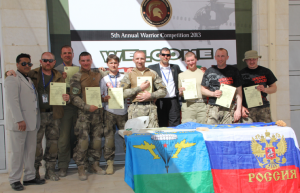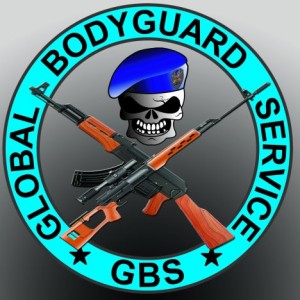Paranoid, competitive and fuelled by guns, alcohol and steroids. That is how one senior contractor in Baghdad describes the private security industry operating in the city’s Green Zone.”Independent”
This is the general opinion on PRIVATE SECURITY DETAILS which to some extend can be true.
Working as a PRIVATE SECURITY DETAIL (PSD) in Middle East and Africa over the years has thought me valuable lessons that I didn’t find them in any book or learnt them in any classes.
One often hears the news of inside shooting and killing the PSDs by local security personnel and wonder how that possible. I used to ask myself don’t they respect the guys and girls who put their lives at risk to train or protect them!
Besides the fact that some of these incidents take place by terrorist activities and out of one’s control but I learnt my conduct is a major factor in gaining respect from locals.
Some very basics but effective approaches and complete changes in my mindset helped me to achieve a constructive relationship with local team to get the job done with ease and incident free.
A. I made myself to learn about their culture and history. The more you know the easier it gets to understand them.
B. I learnt to appreciate their values and respect their laws and customs. ie, when you invited to someone’s house take off your boots before entering the house. when sitting take a cross legs position. Avoid shaking hands with females at the property unless they invite their hands first. Thumbs up doesn’t necessary mean ok, in some countries thumbs up 👍🏻 Translated as an offensive word!
C. I adopted myself to their way of thinking and learnt to look at life the same way as them. It wasn’t easy for start as there were times I felt so frustrated with how slow things can progress.
D. I learnt to keep my emotions under control and never show anger, frustration, sadness or any negative feelings in front of my team. There were times I had to go to my room and slap my face out of frustration in the privacy of my room but never in front of my team.
E. The Devil is in the details.
F. Praise your team openly and criticise them individually in private.
G. Work harder and longer than the rest to set up a role model. Don’t act as a boss act as a leader.
H. Set up roles to achieve your task and follow the roles by the book. Team will find it hard at first but human has the ability of adopting to changes with continuous practice. After a short while it becomes a second nature.
I. No matter how qualified your team think they are, train them up to your standards and monitor their progress.
J. Never call your team members by their first name, in some cultures it’s a sign of respect to add a Sir in local language in front or after of their first name. It shows you respect the individual and not looking down on person.
K. Keep the information based on need to know basis.
L. A good leader must show he/she is in control of the task and has already planned for every possible scenario.
M. Be prepared to help your team emotionally. I had to deal with a scenario that one of my team members received a phone call to inform his wife is leaving him while we were on the task. Be prepared to support them while keeping the task going smoothly.
N. Always start the task by briefing and end it by debriefing meetings.
O. Stay with your team in the same room or compound. It gives them the assurance that you haven’t abandoned them.
P. Eat together on a same table and share the same food together.
R. If there is a difficulty in the task be the first person to volunteer to deal with it. On one of my tasks our vehicle got stuck in the mud in mountain. I was the first person jumped out of the vehicle pushing the car out while I was up to my knees in the mud.
S. Always give extra time before planning to go from A to Z. Terrific jams are part of the local’s life. They don’t mind sitting in traffic for hours. Getting late to their destination it’s not an issue for locals.
T. Driving and traffic roles in some countries are completely different than what you would expect, road accidents are very common and you see cars colliding with each other and drivers start punching up instead of exchanging insurance details. Very common scene on roads in some countries. Try to avoid confrontation and have a second vehicle ready to carry on with the task while the first vehicle waiting for police to arrive and instruct the drivers.
U. Always keep that smile on your face when dealing with locals, it creates trust and shows respect.
V. Chose a smart and practical clothing from local shops, don’t stand out from public with your fancy gear.
W. Always carry local currency in a case you need to hand over some cash to get out of an emergency situation.
X. Look after the neighbours and be generous to them. It’s a costume to be generous to your neighbour.
Y. Always think of worst case scenarios and keep an exit route for yourself and client/s.
Z. After all your team, equipments and vehicles can let you down and abandon the task, have a standby team and secondary equipments/ vehicles ready just in case.
Mehdi Khamseh
CEO
Global Bodyguard Service Ltd
www.globalbodyguardservice.com
Private Military Companies are here to stay
Author: MehdiCharles Mahoney
Professor of Political Science, California State University, Long BeachShare prices of many military and intelligence contractors have risen sharply since President Donald Trump’s election.
Investors are betting that an increase in defense spending will provide a windfall for these firms. For instance, General Dynamics, a large contractor that develops combat vehicles and weapons systems for the U.S. military, saw its stock price jump by more than 30 percent in the months after the election. Likewise, Kratos Defense and Security Services, a smaller firm that builds drones for the U.S. Air Force, saw its shares soar more than 75 percent between November 2016 and May 2017.
This trend may be short-lived. Congress still must decide whether Trump’s proposed 10 percent increase in defense spending is practical given current budget constraints.
What is certain is that for-profit military and intelligence firms will remain an integral part of U.S. national defense. My research focuses on the changing nature of the private defense industry. Military contracting is still big business, although media coverage of private military firms has diminished since the withdrawal of the U.S. from Iraq in 2011. Today, contractors’ work ranges from assisting in drone missions to analyzing signals intelligence to training police forces in fragile countries like Afghanistan.
Like it or not, government agencies responsible for national security are dependent on private defense firms. These companies are primarily responsible to shareholders rather than the American people. How can they be held accountable to the nation’s interests?
New frontiers
In recent years, private military companies have adapted to changing demands from U.S. defense agencies. During the wars in Iraq and Afghanistan, the U.S. military relied heavily on contractors to support counterinsurgency operations. However, high-profile incidents of alleged human rights abuses by the company CACI at Abu Ghraib Prison in Iraq and Blackwater at Nisour Square, Iraq brought to light the difficulty the American military faces monitoring private defense companies.
At the same time, Americans have since become averse to nation-building campaigns in failing states. So, private defense firms have shifted away from supporting “boots on the ground.” Instead, they are increasingly assisting military and intelligence agencies with counterterrorism and cybersecurity.
Cyber attacks in real time shown on a map of the U.S. Octav Ganea/Mediafax via AP
While the American people generally want to avoid deploying troops to conflict zones, they still demand protection from terrorism. The Pentagon, CIA and other defense agencies receive assistance in these areas from private companies with expertise in drone warfare, special forces operations and analysis of electronic surveillance of potential terrorist threats. These traditionally were duties of public employees.Cybersecurity is another area in which private military companies see increasing demand. Information gleaned from hacking government agencies, world leaders and political campaigns can be used by rogue states like Russia and nonstate actors like WikiLeaks to harm American interests.
Governments and multinational corporations realize that protecting classified information and intellectual property is of paramount importance. They are willing to pay top dollar to private defense firms to keep their secrets safe.
Serving the public interest?
Most defense analysts now acknowledge that the question is not whether to privatize, but where to draw the line. If the U.S. government is going to work extensively with contractors, it requires a more robust oversight system. Government agencies and courts also need assurances they can hold defense firms accountable if they break the law overseas.
During the Iraq War, this was a point of serious contention. It was unclear what legal jurisdiction applied to employees of private defense firms. The uncertain legal status of contractors caused significant tension between the U.S. and the government of Iraq and hampered American counterinsurgency efforts.
Here are three ways Congress could increase accountability for private defense firms as the industry becomes more enmeshed in national security.
First, Congress could create an independent regulatory agency to report on contractors’ performance. While major firms in the industry insist they can regulate themselves, an independent oversight agency could more adequately assess how defense contractors perform.
Second, as things stand now, the U.S. government often overlooks bad behavior and renews contracts with companies that have less than stellar records. Instead, the government could more severely penalize firms that do not fulfill the terms of their agreements.
Third, government employees often transition from public service into lucrative positions at billion-dollar defense corporations. Stricter rules to limit this “revolving door” would make government employees more willing to penalize firms.
Private defense contractors will likely be a major part of U.S. national defense for the foreseeable future. Diligent oversight and regulation of companies in this rapidly evolving industry, I believe, are necessary to ensure that these firms advance the public good of American security.
p://theconversation.com
March 2, 2018 | Read More
New Piracy in South Asia
Author: MehdiA new area for pirates, South East Asia have become a new hot spot for Pirates, there have been confirmed reduction of Piracy in Somali but increase of high jacking and extortion in South East Asia.
It looks like 2014 may have been the most dangerous year for Asian seafarers in almost a decade. According to the Singapore-based Regional Cooperation Agreement on Combating Piracy and Armed Robbery against Ships in Asia (ReCAAP), 183 actual or attempted attacks took place in Southeast Asian waters during 2014. This figure represents a marked increase from 150 in 2013 and 133 in 2012, and is the highest since 2006.The latest figures released by the International Maritime Bureau’s (IMB) Piracy Reporting Center corroborate ReCAAP’s findings and show a similar increase in attacks in 2013 and 2014. Since a total of 245 attacks took place worldwide in 2014, Asia now accounts for up to 75 percent of all piracy and armed robbery (PAR) incidents in the world, up from 60 percent in 2013. The continent’s share in global PAR statistics is rapidly increasing as the number of attacks in other parts of the world – most notably the Gulf of Aden – continues to decline.
The surge in incidents in Southeast Asia underscores a worrying trend, one that has seen attacks steadily proliferate since 2013, following a brief decline between 2010 and 2012. Even though PAR is by no means a new phenomenon in the region – Southeast Asia has been known as a piracy hotspot for centuries – the sheer increase in the volume of attacks will perhaps nudge countries in the most affected areas to action. The shipping industry is likely to exert additional pressure on regional governments, as a sustained increase in attacks will put ships and crew at greater risk and is certain to drive up the cost of insurance premiums.
A Closer Look
Over one third of all shipping traverses the Strait of Malacca each year, with an estimated 15.2 million barrels of crude oil transported through this strategic chokepoint every day. Although spikes in attacks had disrupted shipping through the strait in the past (famously prompting the Lloyd’s Market Association to declare it a warzone in 2005), PAR in Asian waters traditionally slipped in and out of (Western) public consciousness and rarely captured global headlines. This is despite the fact that many Westerners – particularly Europeans – would be among the first to feel the effects of major disruption to shipping in the region. The European Union relies heavily on sea-borne trade with countries in the Asia-Pacific – six of its biggest 20 trading partners are located in the region.
However, there are at least three reasons for a lack of significant international attention. First, unlike their more famous counterparts in the Gulf of Aden, pirates in Southeast Asia use violence as a tool less frequently, and there are fewer instances of boarding with firearms. Second, the majority of attacks are directed against small local ships that are easily boarded, rather than major oil tankers or cargo vessels. Third, a large proportion of all attacks consist of petty thefts and crimes of opportunity against ships in ports. Major (and violent) hijackings are a much rarer occurrence than in the Gulf of Aden or the Gulf of Guinea.
Although the share of violent incidents rose substantially in 2014 (more on this below), most PAR attacks still conformed to the three aforementioned characteristics. Still, given the breadth of Asian waters and sea lanes, some areas are bound to be more at risk than others. In order to more accurately assess the PAR threat in Southeast Asia, it is imperative to delve deeper into the numbers.
The Bad News
In Asia, maritime PAR has traditionally been concentrated in the southeast, predominantly in the Strait of Malacca. In recent years, multilateral patrols and organizations such as ReCAAP – which facilitates information sharing and capacity building among its 20 contracting parties in Europe, the Asia-Pacific and North America – have succeeded in reducing PAR in the Strait. However, as counter-piracy efforts intensified in one area, most of the attacks shifted eastward toward the Singapore Strait, the South China Sea, and particularly the waters and harbors of Indonesia.
According to the IMB’s 2014 Annual Report, the number of attacks increased across Southeast Asia, with no areas registering a noticeable decline from the year before. The vast majority (100) of all actual and attempted attacks took place in and around Indonesia, with many occurring in the narrow strip of sea separating the Indonesian island of Pulau Karimun Besar from Singapore. Over half of all attacks were carried out in just five of Indonesia’s ports and anchorages, with the most (35) taking place on the island of Pulau Bintan. Although the number of incidents was down slightly from 106 in 2013, the figure is still more than double the 40 attacks reported in 2010.
Malaysia and the adjacent portion of the South China Sea have seen the largest year-on-year increase in attacks. The IMB registered 24 incidents in 2014, almost three times as many (9) as in 2013. During the same period, ReCAAP registered 23 incidents, up from just one the year before. Most attacks took place off of the southeastern tip of the Malay Peninsula.
Bangladesh is fast becoming another notable flashpoint, with the IMB recording 21 reported incidents, up from 12 the year before. During the same year, ReCAAP registered 14 incidents, more than double the six it had logged the year before. Almost all of the attacks (18) were armed robberies that took place in Chittagong Port.
The surge in the number of PAR incidents throughout the year was accompanied by a notable rise in attacks against larger ships and the use of firearms, particularly in Indonesia. According to ReCAAP, the number of “very significant” incidents – those that result in substantial economic damage and/or are particularly violent – increased substantially, largely owing to more widespread (and lucrative) siphoning of fuel and oil. Such siphoning requires complex planning and greater operational capacity, suggesting a growing importance of organized crime groups. The most common targets of siphoning attacks are product or oil tankers under 5000 gross tons (GT).
According to the IMB, attackers were armed with guns in 34 instances; almost triple the 13 in 2012. This proliferation of small arms resulted in three deaths, most recently on December 8, 2014, when an engineer aboard a Vietnamese tanker was shot by armed attackers. Three fatalities within a year is an exceptionally high number for Southeast Asia, and may signify the beginning of a possible shift from the prevailing modus operandi whereby attackers usually flee if caught red-handed by the crew.
The Good News
Fortunately, 2014 was not all bad news. According to ReCAAP’s Assistant Director Lee Yin Hui, over half of all incidents were logged as petty thefts. This means that most pirate attacks or robberies resulted in minor economic damage and did not lead to crew injuries. Most attacks remained opportunistic in nature and predominantly targeted tug boats, barges, cargo ships, and other vessels, with the intent of stealing cash, crews’ personal effects, or scrap metal. According to Lee Yin Hui, most incidents resulted in no economic loss at all, while the attackers generally fled after being discovered. Moreover, despite the more frequent use of firearms, the vast majority of attackers still remained unarmed or carried “just” knives or machetes.
There is another potential silver lining. The numbers of attacks recorded by organizations such as the IMB and ReCAAP frequently diverge, owing to differences in geographic designations and data collection methods. However, both institutions rely on one single decisive factor when compiling their statistics: reporting.
Shipowners may be reluctant to report attacks for a number of reasons, including concerns over the company’s safety record, potential liability, or simply to avoid higher insurance premiums. As a rule, many attacks go unreported worldwide. Even though it is impossible to determine the extent of underreporting, at least a part of last year’s surge in recorded incidents may be due to more diligent shipowners. If true, this may possibly indicate an increase in awareness of the importance of reporting successful or attempted attacks.
Stemming the Tide
As 2014 drew to a close, it revealed the full extent of Southeast Asia’s piracy headache. The number of incidents soared, attacks became more deadly, and strikes against larger targets suggest an increasing presence of well-organized criminal groups. Although the majority of attacks continue to be small scale and cause little direct physical and economic damage, the potential indirect impact of the piracy surge should be enough to prompt regional countries into action. Even minor disruptions to trade routes can have global economic consequences, drive up insurance premiums, and lead to expensive rerouting and additional security costs.
Below are some suggestions that might help stem the rising tide:
Devote more attention to PAR within multilateral organizations and forums. Setting piracy higher on the agenda within existing forums could be the fastest and cheapest way to more multilateral exercises, capacity building an information sharing. For example, counter-piracy could be prioritized in one or more of the ASEAN Regional Forum’s (ARF) many bodies, such as the ARF Inter-Sessional Meeting on Maritime Security or the ASEAN Defense Ministers’ Meeting- Plus.
Expand and strengthen existing counter-piracy frameworks. ReCAAP has made an important contribution in fostering mutual trust and promoting information sharing between 20 countries in the Asia-Pacific, Europe and North America. However, its limited budget and capabilities may leave it ill-equipped to stem the rising tide of well-armed and organized sea raiders. The organization’s founding document gives it a broad mandate that includes the possibility of tailored bilateral and multilateral cooperation. If the political will within its 20 member countries exists, ReCAAP could serve as an effective platform for joint counter-piracy exercises or capacity building programs.
Expand and strengthen existing counter-piracy patrols. As pirates shift their attention to the south and east of the Strait of Malacca, initiatives such as the highly effective Malacca Strait Patrols (MSP), conducted by Indonesia, Malaysia, Singapore and Thailand, should follow suit.
Take the initiative. Southeast Asia’s counter-piracy efforts seem to lack decisive leadership. When Japan hosted the Asia Anti-Piracy Conference in Tokyo in 2000, it proved that a little bit of initiative can even lead to substantial results, such as the establishment of the world’s first intergovernmental body created solely to combat piracy. There is no reason why a country like pirate-beleaguered Indonesia, under its decisive new President Joko Widodo, could not emerge as a candidate for just such leadership.
Although “significant and worrying,” the problem is still manageable, and for the most part restricted to several geographic locales. Just the same, Southeast Asian states will need to act or risk their piracy headache spiraling out of control sooner rather than later.Miha Hribernik is a political risk analyst based in the United Kingdom.
TopicsFeaturesSecuritySoutheast Asia
April 21, 2015 | Read More
TagsMalacca Straitpiracypiracy and armed robberyRegional Cooperation Agreement on Combating Piracy and Armed Robbery against Ships in Asia
Counter Terror Expo London 2014
Author: MehdiCounter Terror Expo 29-30 April 2014, Olympia, London is the premier international event delivering buyers and specifiers from across the world within Government, Military, Law Enforcement, Emergency Services, Critical National Infrastructure, Private Sector and the Security Services. Picture GBS Team in CT Expo London 2014.
April 30, 2014 | Read More
Global Bodyguard Servic – France
Author: MehdiGlobal Bodyguard Service is pleased to announce a branch office in France. With the rapid growth in United Kingdom, we are opening a new office to provide you with one of the most advanced security training courses. Please bring all your security training requirements to GBS HQ, the finest professionals in the business.
December 3, 2013 | Read More
GBS team – Warrior Championship – Jordan
Author: Mehdihttp://www.specnaz.ru/articles/199/18/1826.htm
August 11, 2013 | Read More
Global Bodyguard Service new PSD badge
Author: Mehdi| Read More
Welcome
Author: MehdiToday we launch a new website with the potential to deliver our future technologies along with the capabilities of expansion to meet our on going growth, the new platform will enable us to remain up to date and future proofed.
This accomplishment will drive us forward over time and ensure that we’re able to meet the demands of our world wide audience.
April 11, 2013 | Read More















